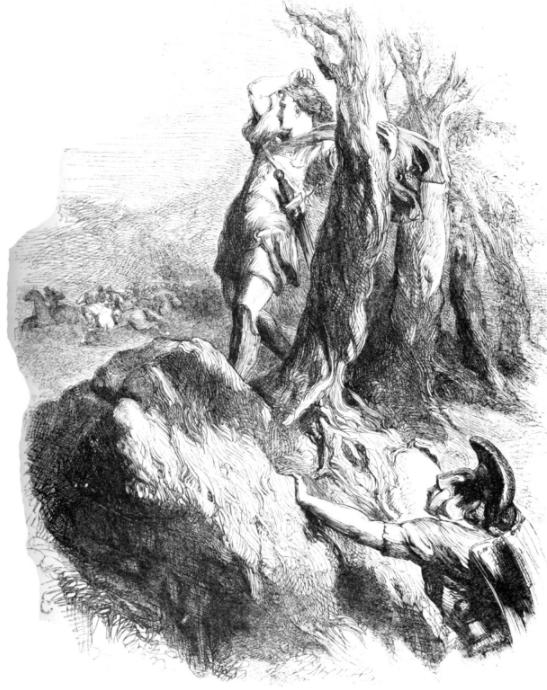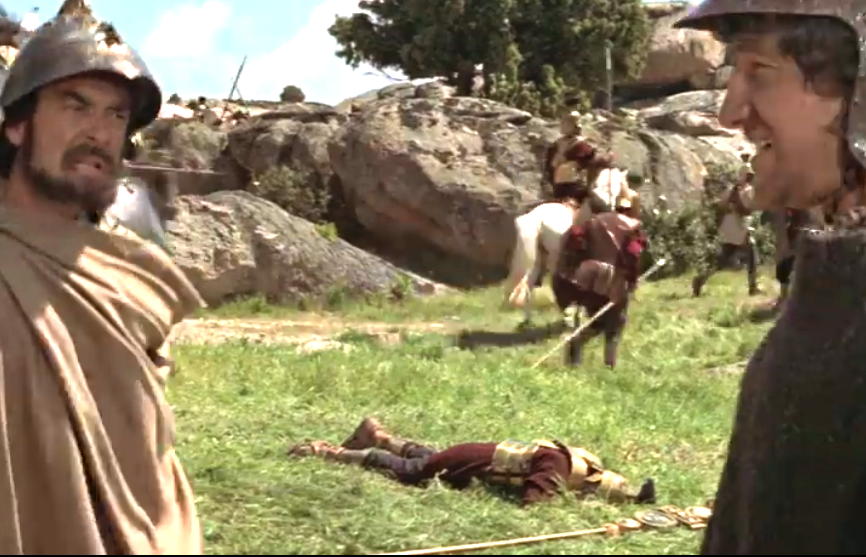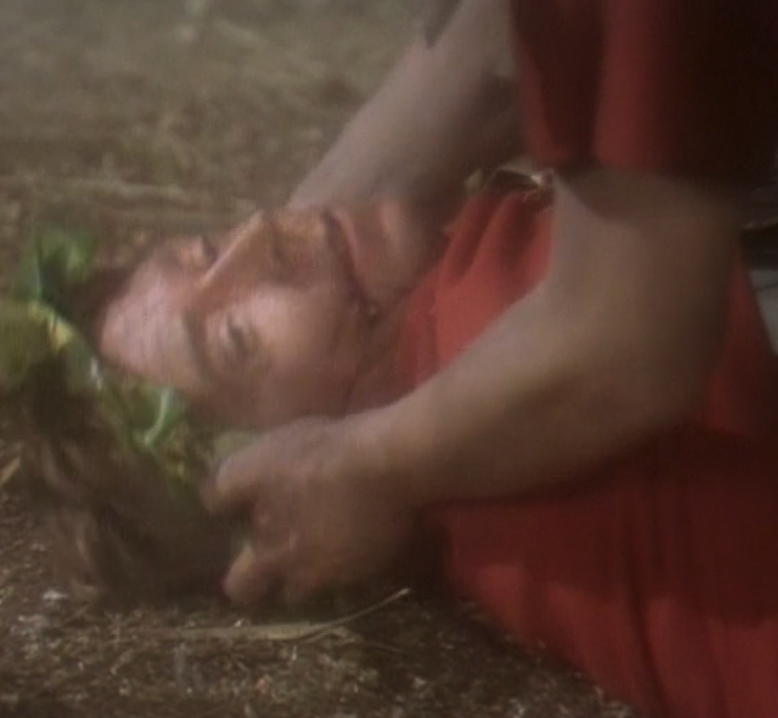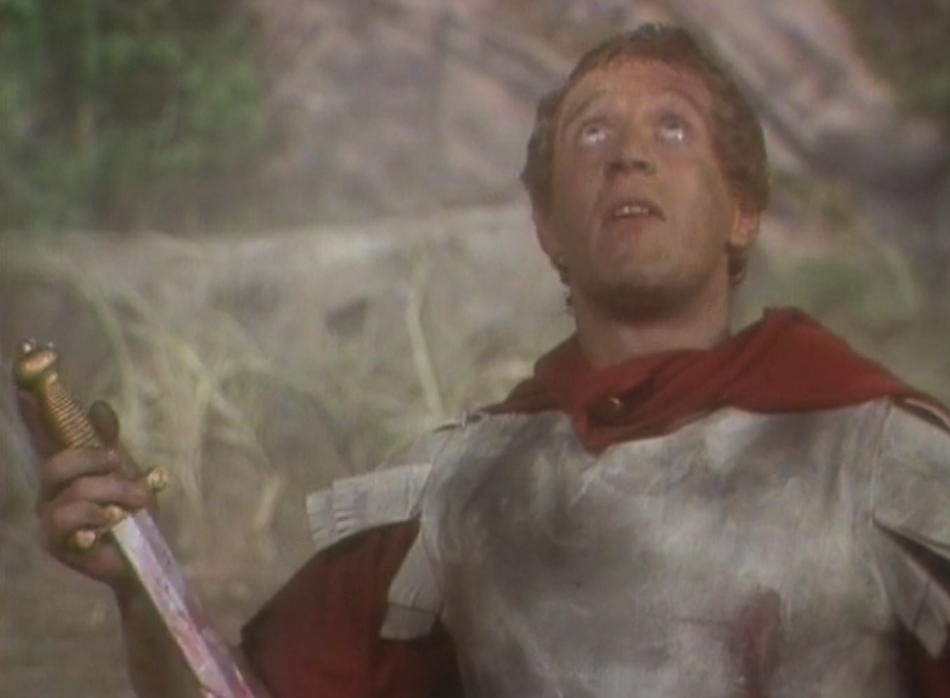Julius Caesar: Act 5, Scene 3
Alarums. [A bleeding Roman soldier
Alarums: trumpet calls.
staggers out, falls, and dies.] Enter
CASSIUS [carrying a standard]
and TITINIUS.
CASSIUS
1 O, look, Titinius, look, the villains fly!
1. the villains: i.e., Cassius' troops. fly: run away.
2 Myself have to mine own turn'd enemy:
2. mine own: i.e., my own soldiers.
3 This ensign here of mine was turning back;
3. ensign: standard bearer.
4 I slew the coward, and did take it from him.
TITINIUS
5 O Cassius, Brutus gave the word too early; 6 Who, having some advantage on Octavius, 7 Took it too eagerly: his soldiers fell to spoil,
7. spoil: looting.
8 Whilst we by Antony are all enclosed.
8. enclosed: surrounded.
Enter PINDARUS.
PINDARUS
9 Fly further off, my lord, fly further off; 10 Mark Antony is in your tents, my lord
10. is in your tents: i.e., has over-run your camp.
11 Fly, therefore, noble Cassius, fly far off. CASSIUS
12 This hill is far enough. Look, look, Titinius; 13 Are those my tents where I perceive the fire? TITINIUS
14 They are, my lord. CASSIUS
Titinius, if thou lovest me, 15 Mount thou my horse, and hide thy spurs in him,
15. hide thy spurs in him: i.e., dig the spurs in deep.
16 Till he have brought thee up to yonder troops, 17 And here again; that I may rest assured 18 Whether yond troops are friend or enemy. TITINIUS
19 I will be here again, even with a thought.
19. even with a thought: as quick as thought
Exit.
CASSIUS
20 Go, Pindarus, get higher on that hill; 21 My sight was ever thick; regard Titinius,
21. thick: dim. regard: observe.
22 And tell me what thou notest about the field.
22. notest about the field: see of the situation on the field of battle.
[PINDARUS goes up.]
stage direction. goes up: goes up to a gallery above the stage. >>>
23 This day I breathed first: time is come round,
23. This day I breathed first: today is my birthday.
24 And where I did begin, there shall I end; 25 My life is run his compass. Sirrah, what news?
25. his compass: its full circle. Sirrah: This is a word used to address an inferior, particularly a servant boy; it can be an insult, but I don't think it is here.
PINDARUS (Above.)
26 O my lord! CASSIUS
27 What news? PINDARUS
28 Titinius is enclosed round about 29 With horsemen, that make to him on the spur;
29. make to him on the spur: i.e., ride rapidly to him.
30 Yet he spurs on. Now they are almost on him.
30. spurs on: continues to ride as fast as ever.
31 Now, Titinius! Now some light. O, he lights too.
31. light: alight; dismount.
32 He's ta'en.
32. ta'en: taken captive. — Pindarus is wrong; Titinius is actually being welcomed by soldiers from Brutus' wing. However, since this a battle between two Roman armies it's difficult to distinguish friend from foe.


Shout.
And, hark! they shout for joy. CASSIUS
33 Come down, behold no more. 34 O, coward that I am, to live so long, 35 To see my best friend ta'en before my face! PINDARUS [descends].
36 Come hither, sirrah: 37 In Parthia did I take thee prisoner;
37. Parthia: It was located in present-day northeastern Iran.
38 And then I swore thee, saving of thy life,
38. swore . . . life: made you swear because I spared your life.
39 That whatsoever I did bid thee do, 40 Thou shouldst attempt it. Come now, keep thine oath; 41 Now be a freeman: and with this good sword,
41. Now be a freeman: Upon the death of Cassius, his bondman, Pindarus, will be free.
42 That ran through Caesar's bowels, search this bosom.
42. search this bosom: i.e., stab me in the heart.
43 Stand not to answer: here, take thou the hilts;
43. Stand not to answer: don't pause to ask questions. the hilts: the handle of the sword.
44 And, when my face is cover'd, as 'tis now, 45 Guide thou the sword. [PINDARUS stabs him.]
Caesar, thou art revenged, 46 Even with the sword that kill'd thee. [Dies.]
PINDARUS
47 So, I am free; yet would not so have been,
48 Durst I have done my will. O Cassius,
47-48. I am . . . will: i.e., now I am free, but I would not have gained my freedom by killing my master if I had dared to do what I wanted.
49 Far from this country Pindarus shall run, 50 Where never Roman shall take note of him. [Exit.]
Enter TITINIUS [wearing a laurel
wreath on his head] and MESSALA.
laurel wreath: The laurel wreath was a symbol of victory.
MESSALA
51 It is but change, Titinius; for Octavius
51. It is but change: i.e., the results of today's battle are merely an exchange of wins and losses which don't do anything to change the balance of power.
52 Is overthrown by noble Brutus' power, 53 As Cassius' legions are by Antony. TITINIUS
54 These tidings will well comfort Cassius. MESSALA
55 Where did you leave him? TITINIUS
All disconsolate, 56 With Pindarus his bondman, on this hill. MESSALA
57 Is not that he that lies upon the ground? TITINIUS
58 He lies not like the living. O my heart! MESSALA
59 Is not that he? TITINIUS
No, this was he, Messala, 60 But Cassius is no more. O setting sun, 61 As in thy red rays thou dost sink tonight, 62 So in his red blood Cassius' day is set; 63 The sun of Rome is set! Our day is gone; 64 Clouds, dews, and dangers come; our deeds are done!
64. Clouds . . . done!: i.e., now will will damp whether bring disease and other evils, because our fighting days are over.
65 Mistrust of my success hath done this deed.
65. Mistrust of my success: loss of hope about the outcome of my mission.
MESSALA
66 Mistrust of good success hath done this deed.
66. Mistrust of good successs: loss of hope for any good outcome.
67 O hateful error, melancholy's child, 68 Why dost thou show to the apt thoughts of men
68. apt: impressionable.
69 The things that are not? O error, soon conceived, 70 Thou never comest unto a happy birth, 71 But kill'st the mother that engender'd thee!
71. the mother that engender'd thee: i.e., the melancholy person who gave you birth. (In this case, it's Cassius.)
TITINIUS
72 What, Pindarus! where art thou, Pindarus? MESSALA
73 Seek him, Titinius, whilst I go to meet 74 The noble Brutus, thrusting this report 75 Into his ears; I may say, thrusting it; 76 For piercing steel and darts envenomed
76. darts envenomed: poisoned spears
77 Shall be as welcome to the ears of Brutus 78 As tidings of this sight. TITINIUS
Hie you, Messala,
78. Hie: hurry.
79 And I will seek for Pindarus the while. [Exit MESSALA.]
80 Why didst thou send me forth, brave Cassius? 81 Did I not meet thy friends? and did not they 82 Put on my brows this wreath of victory, 83 And bid me give it thee? Didst thou not hear their shouts? 84 Alas, thou hast misconstrued every thing! 85 But, hold thee, take this garland on thy brow;
85. hold thee: wait a minute.
[Titinius places his laurel wreath on the head]
of Cassius.]
86 Thy Brutus bid me give it thee, and I 87 Will do his bidding. Brutus, come apace,
87. apace: quickly.
88 And see how I regarded Caius Cassius. 89 By your leave, gods:—this is a Roman's part
89. this is a Roman's part: i.e., committing suicide is to act like a true Roman.
90 Come, Cassius' sword, and find Titinius' heart. [Titinius takes Cassius' sword and
stabs himself.] Dies.
Alarum. Enter BRUTUS, MESSALA,
young CATO, STRATO, VOLUMNIUS,
and LUCILIUS.
BRUTUS
91 Where, where, Messala, doth his body lie? MESSALA
92 Lo, yonder, and Titinius mourning it. BRUTUS
93 Titinius' face is upward. CATO
He is slain. BRUTUS
94 O Julius Caesar, thou art mighty yet! 95 Thy spirit walks abroad and turns our swords 96 In our own proper entrails.
96. In our own proper entrails: towards our very own guts.
Low alarums.
Low alarums: faint trumpet calls.
CATO
Brave Titinius! 97 Look, whether he have not crown'd dead Cassius!
97. whether he have not: This is an expression of amazement, like "if he hasn't."
BRUTUS
98 Are yet two Romans living such as these? 99 The last of all the Romans, fare thee well!100 It is impossible that ever Rome101 Should breed thy fellow. Friends, I owe more tears
101. breed thy fellow: produce your equals.
102 To this dead man than you shall see me pay.103 I shall find time, Cassius, I shall find time.104 Come, therefore, and to Thasos send his body:
104. Thasos: Thasos is an island near Philippi, and the battlefield near Philippi is the setting of this scene.
105 His funerals shall not be in our camp,
106 Lest it discomfort us. Lucilius, come;
106. discomfort: demoralize.
107 And come, young Cato; let us to the field.108 Labeo and Flavius, set our battles on:
108. set our battles on: send our troops forward.
109 'Tis three o'clock; and, Romans, yet ere night110 We shall try fortune in a second fight.
110. try fortune: see what our luck is.
Exeunt.


